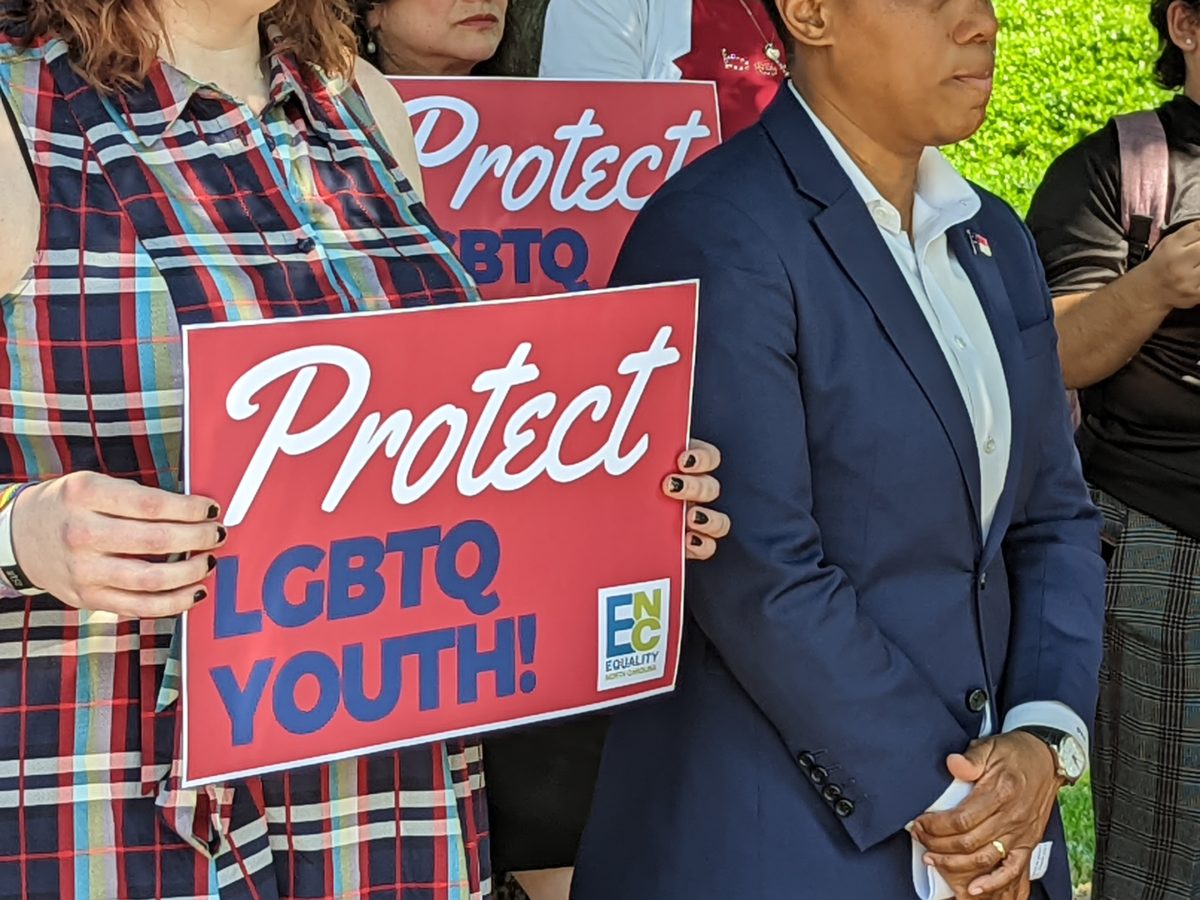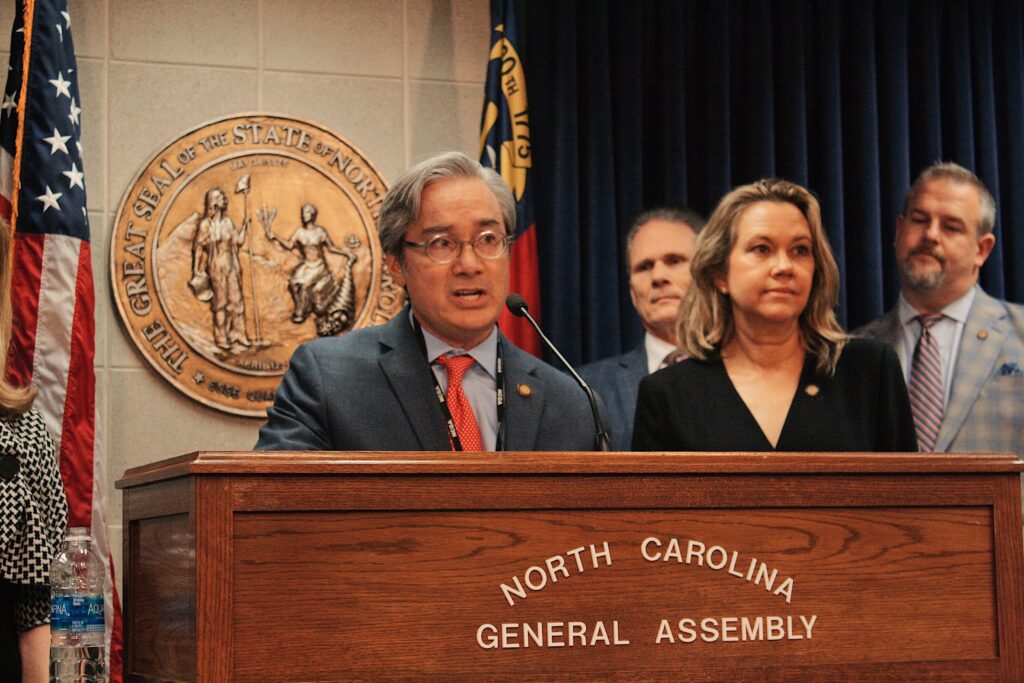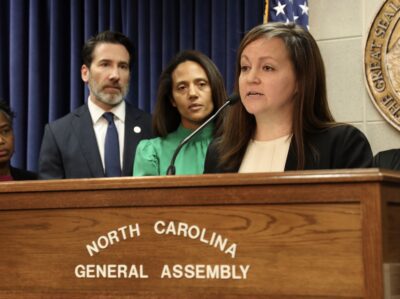
Share this story
- The Republican-led General Assembly recently overrode six bills vetoed by Democratic Gov. Roy Cooper in July, and three have direct impacts on LGBTQ+ youth in North Carolina. Each will now become state law, as districts across the state return to school.
- Nearly half of all LGBTQ+ youth in N.C. seriously considered attempting suicide, per the most recent Youth Risk Behavior Survey. LGBTQ+ youth report much lower rates of attempting suicide when their school is affirming, 2022 Trevor Project data show.
|
|
The Republican-led General Assembly last week overrode six bills vetoed by Democratic Gov. Roy Cooper in July, and three have a direct impact on LGBTQ+ youth in North Carolina.
Each will now become state law, just as districts across the state are heading back to school.
- House Bill 808 severely restricts the use of surgical gender transition procedures, puberty-blocking drugs, and hormone therapy to minors, defined as someone younger than 18.
- House Bill 574 requires transgender athletes at the middle, high school, and college levels to play on sports teams assigned by their “reproductive biology and genetics at birth.”
- Senate Bill 49, the so-called “Parents’ Bill of Rights,” limits instruction of gender identity and sexuality in K-4 classrooms. The legislation also mandates that schools notify parents “prior to any changes in the name or pronoun used for a student in school records or by school personnel,” which LGBTQ+ advocates say will force educators to out students.
Soon after the overrides passed, Cooper released a statement criticizing the legislature for returning after nearly six weeks of inaction “to pass legislation that discriminates.”
“These are the wrong priorities,” Cooper said. “Especially when they should be working nights and weekends if necessary to get a budget passed by the end of the month.”
Until last week, it was quiet at the General Assembly this summer, with Republican leaders saying it is now likely a budget will be passed the second week of September — instead of the original July 1 target.
Republican leaders characterized the six veto overrides as wins for North Carolina parents, women, and families.
“While Governor Cooper has tried to stand between parents and their kids, today the NC House will continue to affirm parent’s rights, protect female athletes, and advocate for the health and safety of our children,” House Speaker Tim Moore, R-Cleveland, said in a statement.
“Democrats want to keep North Carolina’s education system shielded from parental accountability. They want to use our schools to advance their partisan, political agenda instead of working to improve student outcomes,” Sen. Amy Galey, R-Alamance, said in a Senate release. “The ‘Parents’ Bill of Rights’ fights back against those efforts.”
State Superintendent Catherine Truitt also offered her support of the veto overrides for HB 574 and SB 49 on Twitter.
Two House Democrats — Rep. Garland Pierce, D-Hoke, and Rep. Michael Wray, D-Halifax — voted with Republicans to override vetoes for HB 574 and HB 808.
Shortly after the bill overrides were passed, Equality NC released a statement calling the legislation “the slate of hate.”
“Our heart breaks for the many people, particularly trans youth and their families, whose lives will be harmed by this cruel legislation,” the statement said. “The General Assembly passed these bills in the face of vociferous and highly motivated opposition, including thousands of letters, phone calls, testimonies, and protests.”
The General Assembly also overrode two bills related to charter schools.
House Bill 219 would change the current determination of per-pupil funding that traditional public schools share with local charter schools. The bill could leave districts with less money per student. House Bill 618 would move authority from the State Board of Education and grant it to a new Charter School Review Board.
You can read EdNC’s previous report on bills that made crossover at this link.
Bills concerning transgender students
HB 808 makes it illegal for doctors to “perform a surgical gender transition procedure on a minor or to prescribe, provide, or dispense puberty-blocking drugs or cross-sex hormones to a minor.” Six exceptions are listed given parental/guardian consent.
Minors who began treatment before Aug. 1 could continue receiving that care under parental consent if their doctors deem its in the best medical interest of the minor.
About 1.8% of youth and 0.6% of adults in the United States identify as transgender, according to a 2022 report from the University of Colorado Anschutz Medical Campus. Numerous medical organizations recommend “medical care that respects the gender identity of the patient,” the report says, including the American Academy of Pediatrics, Endocrine Society, and the American Psychological Association.
Transgender minors very rarely receive surgical interventions, according to a report by the Associated Press, but they are commonly prescribed drugs to delay puberty and sometimes begin taking hormones before they reach adulthood.
Approximately 35% of transgender youth now live in states that have passed bans on gender-affirming care. Advocates say such bans harm LGBTQ+ youth – in some cases, putting their lives at risk.
According to the most recent Youth Risk Behavior Survey, nearly half of all LGBTQ+ youth in North Carolina seriously considered attempting suicide, compared to 22% of students overall.
Many LGBTQ+ people, but youth in particular, struggle with mental health due to discrimination or a lack of support. But LGBTQ+ youth ages 13-24 report significantly lower rates of attempting suicide when their school or community is accepting of LGBTQ+ people, according to the Trevor Project’s 2022 National Survey on LGBTQ Youth Mental Health.
With the passage of HB 574 into law, North Carolina also joins 22 other states that have banned transgender youth from participation in sports. The law took effect immediately.
HB 574 mandates that “athletic teams designated for females, women, or girls shall not be open to students of the male sex,” adding that “a student’s sex shall be recognized based solely on the student’s reproductive biology and genetics at birth.”
The law applies to middle school and high school athletics — including charter schools, and non-public schools when they compete with North Carolina public schools. The legislation also includes collegiate athletics, with the exception of intramural sports.
“We must take a stand now to protect women, otherwise, Democrats will do everything they can to eviscerate every even playing field women have,” Sen. Vickie Sawyer, R-Iredell, said in the Senate statement. “Our daughters should not be forced to compete against biological men and overriding Gov. Cooper’s veto of this legislation ensures our daughters do not have to worry about that.”
Very few transgender athletes compete in sports in North Carolina, according to a report from N.C. Health News.
The N.C. High School Athletic Association adopted a policy in 2019 to allow transgender athletes to play on teams that align with their gender identities. Commissioner Que Tucker previously told NC Health News that only 18 requests had been filed since then. Only two of the requests have been from transgender females.

More on the ‘Parents’ Bill of Rights’
SB 49 bans curriculum on gender identity, sexual activity, or sexuality in kindergarten through fourth grade and allows parents to review all materials used in class, among many other things.
Curriculum, as defined by the bill, includes “the standard course of study and support materials, locally developed curriculum, supplemental instruction, and textbooks and other supplementary materials.” It does not include responses to student-initiated questions.
All but one section took effect immediately, leaving teachers and schools trying to figure out how to comply with the new law as the new school year starts.
Some school boards have released statements in opposition to the bills and in support of LGBTQ+ students. Other schools or districts have begun implementing policies advising teachers to no longer ask students for their pronouns and preferred name.
Republicans argue the bills provide important safeguards in education, while opponents say the bills will create chilling effects for educators. Critics also say it is dangerous to LGBTQ+ kids and will damage educators’ relationships with students.
Some people also worry the bill will threaten the safe haven that schools provide for students experiencing abuse, as EdNC previously reported.
In May 2022, the House did not take up a nearly identical bill, which passed the Senate. At the time, Cooper criticized the bill, and Republicans didn’t have the numbers to override his likely veto. That changed with this year’s Republican supermajority, secured after Rep. Tricia Cotham — elected as a Democrat from Mecklenburg County — announced her switch to the party in April.
SB 49 lists the same 10 parental rights as last year’s bill, which was also vetoed by Cooper. Those rights include the right to direct the education/care of their child, to direct the upbringing and moral or religious training of their child, and to access and review all education and medical records related to their child (with listed exceptions), among others.
The bill says a state employee “who encourages, coerces, or attempts to encourage or coerce a child to withhold information from his or her parent may be subject to disciplinary action.” A parent, as defined by the bill, is any “person who has legal custody of a child.”
The governing bodies of public schools must also adopt procedures to notify a parent about their child’s physical and mental health, including any school health care services they use, changes to their well-being, or requests to change a student’s pronouns.
Most of the rights included in the law are already afforded to parents. Additional rights include knowing the library books your child checks out, allowing parents to review all curriculum, and establishing remedies and timelines for parental concerns.
State Board of Education Chair Eric Davis and Vice-Chair Alan Duncan previously wrote to Republican lawmakers regarding concerns with the process outlined for resolving parental concerns in the bill.
Under the provision for remedying parent concerns, the bill mandates that school governing bodies adopt procedures for parents to notify principals regarding concerns about curriculum. A process to resolve concerns should take place within seven days of the date of notification by the parent, the bills says.
After 30 days, “the public school unit shall provide a statement of the reasons for not resolving the concern.” At that point, parents can also request a “parental concerning hearing” with the State Board of Education.
“The concern from the State Board’s perspective is that this process does not provide the State Board with any authority to enforce a decision that it might make with regard to a proposed solution to the concerns,” the letter reads. “To make an appeal hearing decision meaningful under the terms of the bill would require authorizing the State Board to encroach upon the PSUs authority, undermining NC’s traditional approach to local control over these matter.”
As currently written, the hearings “will likely be a frustrating exercise in futility for all involved,” the letter says, and a “significant expenditure of resources.” The letter also raises concern with the lack of funding to school districts for the hearing officers outlined in the bill.
Meanwhile, public schools across the state are working to address pre-existing staffing vacancies, while operating on last year’s funding until a new budget is adopted.
At the same time, schools are also working to meet the rising mental health needs for all students, address the impact of remote learning and COVID-19, welcome students and families back to school, and much more.
“We have so many other important needs and issues that should be at the top of our list when thinking about how to support our students and strengthen our schools,” Scott Elliott, former superintendent of Watauga County Schools, previously told EdNC.





